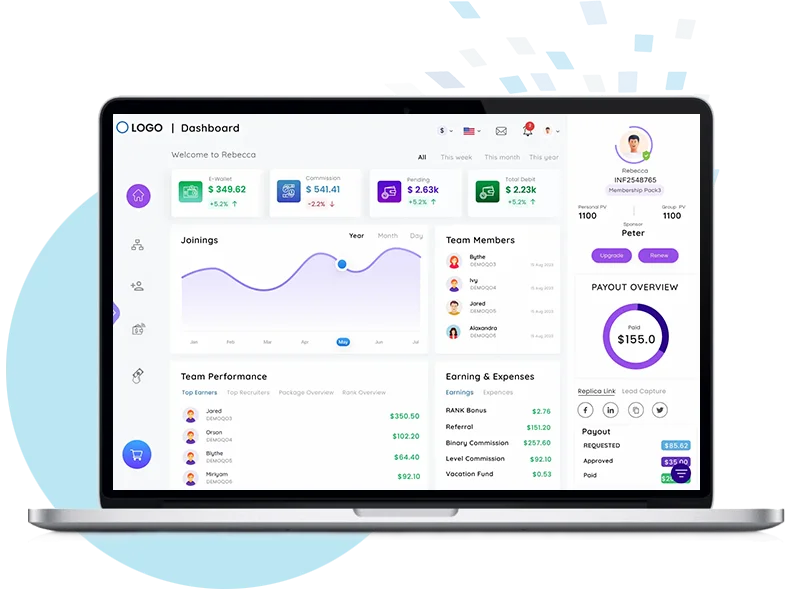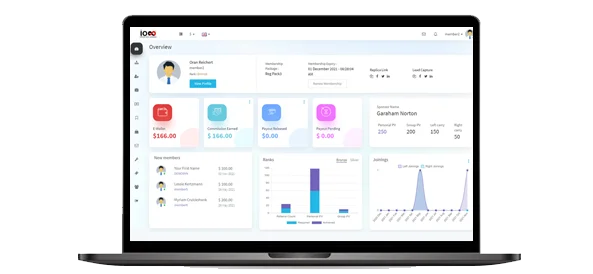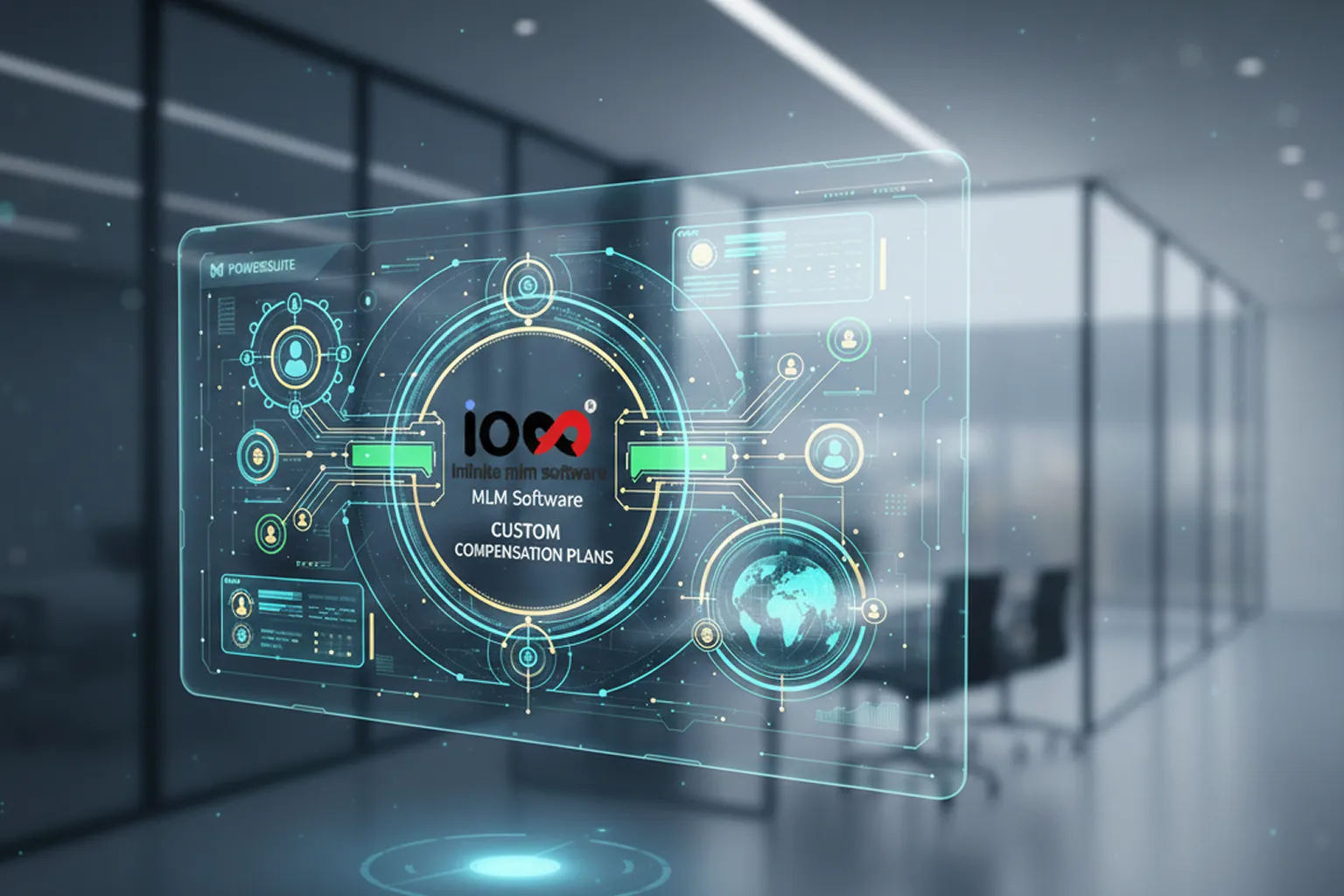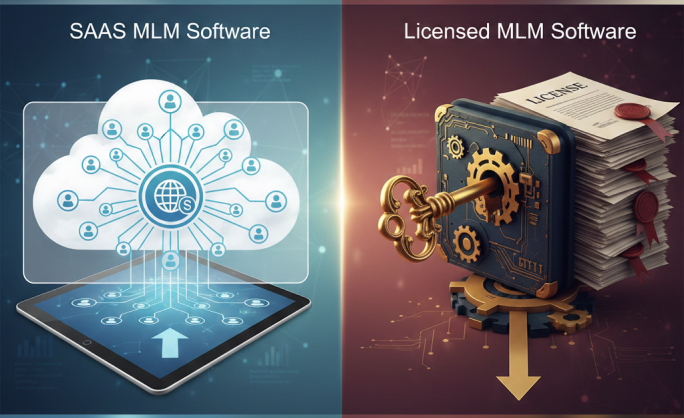Ever heard of blockchain technology being used in Multi-Level Marketing? While the MLM industry has faced its share of skepticism, blockchain offers exciting possibilities for a more secure and transparent future.
By integrating blockchain into MLM software, businesses can unfold a new era of security, accountability, and empowerment for distributors. This blog will walk you through the advantages of blockchain in MLM, exploring how this innovative technology can build trust and pave the way for a more prosperous future for the MLM industry.
Understanding Blockchain Technology
At its core, blockchain is a distributed ledger technology. So how does this translate to security? Blockchain utilizes strong cryptography to encrypt every transaction on the ledger. This encryption scrambles the data, making it nearly impossible to tamper with.
Smart Contracts: Automating Trust
One of the key components is smart contracts. These are self-executing agreements written in code and stored on the blockchain. When predetermined conditions are met, the smart contract automatically executes, removing the need for intermediaries. In an MLM setting, this could automate commission payouts based on predefined sales structures, ensuring fairness and eliminating human error.
Why is Blockchain Secure?
The combination of these features – distributed ledger, encryption, creates an incredibly secure system. Here’s how:
Cryptography:
Every piece of data on a blockchain is encrypted, making it scrambled and unreadable without a specific key. This encryption ensures the data’s integrity and authenticity.
Immutability:
Once a record is added to the blockchain, it’s nearly impossible to change it. This is because each block contains a unique code (cryptographic hash) based on its own data and the hash of the block. Altering any data within a block would change its hash, and this change would be reflected in all subsequent blocks, making the tampering easily detectable.
Consensus Mechanisms:
Not all blockchains operate the same way. Many rely on consensus mechanisms, where a certain number of computers on the network (nodes) need to agree on the validity of a transaction. This adds another layer of security, making it difficult for a single entity to manipulate the data.
What is MLM Business ?
Multi Level marketing (MLM) is a legitimate business approach employed by certain direct selling companies to sell products and services. It involves members promoting and selling these offerings to others, while also recruiting new members into the business. Individuals earn a percentage of their recruits’ sales, with commissions distributed across various levels. It’s crucial for MLM programs to adhere to FTC regulations to avoid operating as illegal pyramid schemes, which the FTC actively investigates.
The Intersection of Blockchain and MLM
Blockchain technology, known for its secure and transparent nature, offers exciting possibilities for the future of MLM. By integrating blockchain in MLM, businesses can address longstanding challenges and create a more secure and trustworthy environment for all participants
By using the blockchain, MLM transactions such as commissions and payouts are recorded on the blockchain. Once recorded, they are unchangeable, eliminating all the possible risks of fraudulent transactions. The blockchain interface allows users to track their earnings and transactions in real time.
Blockchain Addressing Traditional MLM Challenges
Here’s how blockchain tackles some of the most common challenges in MLM:

Fraud and Pyramid Schemes:
Blockchain’s secure, tamper-proof ledger makes it nearly impossible to expand sales figures or manipulate commissions, a common tactic in pyramid schemes.

Lack of Transparency:
The distributed nature of blockchain allows all participants to view transaction history, cultivating trust and accountability within the MLM structure.

Opaque Commission Structures:
Smart contracts, self-executing agreements stored on the blockchain, can automate commission payouts based on predefined rules. This eliminates human error and ensures all parties are compensated fairly.

Centralized Control:
Traditional MLM structures often rely on a central authority to manage data and payouts. Blockchain decentralizes this process, reducing the risk of manipulation and empowering distributors
Introducing Blockchain MLM Software
Blockchain MLM software leverages blockchain technology to create a secure and transparent platform for MLM businesses. This software can handle tasks like:
Distributor onboarding:
Securely storing distributor information and tracking their activity within the network.
Product tracking:
Providing a tamper-proof record of product movement from manufacturing to distributors.
Commission management:
Automating commission payouts based on smart contracts, ensuring fair and timely compensation.
The integration of blockchain technology holds immense potential for the future of MLM. By addressing longstanding challenges and promoting transparency, blockchain can help rebuild trust and create a more sustainable and reputable MLM landscape.
Advantages of Blockchain MLM Software in MLM Business Operations

Increased Transparency and Trust
Blockchain MLM software lies in its transparency. With blockchain, every transaction, whether it’s a product sale or a commission payout, is recorded on an immutable ledger visible to all participants. This transparency builds trust among members, as they can independently verify the integrity of the system, nurturing a culture of openness and accountability.
Enhanced Security
Blockchain MLM software offers a robust solution to safeguard sensitive data and transactions. With cryptographic techniques and a decentralized architecture, blockchain ensures that data remains tamper-proof and resistant to hacking or unauthorized access. Each transaction is cryptographically linked to the preceding one, creating a chain of blocks that is virtually impossible to alter without consensus from the network.
Automated Smart Contracts
Smart contracts represent the essence of automation in MLM business operations. These self-executing contracts are encoded with predefined rules and conditions, eliminating the need for intermediaries and streamlining processes such as commission calculations and incentive distributions. With blockchain MLM software, smart contracts execute transactions autonomously, ensuring accuracy, efficiency, and transparency every step of the way.
Decentralized Control
One of the hallmarks of blockchain technology is its decentralized nature, which empowers participants with greater control over their data and transactions. Blockchain MLM software operates on a peer-to-peer network, where decisions are made collectively by the community. This decentralization not only promotes inclusivity and fairness but also reduces the risk of manipulation or exploitation.
Cost Efficiency
Cost of the software is a critical factor in MLM business operation, and blockchain MLM software delivers significant savings by eliminating intermediaries, reducing administrative overhead, and automating repetitive tasks. With streamlined processes and lower transaction fees, MLM businesses can allocate resources more effectively, maximizing profitability and sustainability in the long run.
Global Accessibility
Blockchain technology transcends geographical boundaries, offering global accessibility to participants regardless of their location. With blockchain MLM software, individuals from diverse backgrounds can join the network, expand their reach, and tap into new markets with ease. This global reach enhances the diversity and inclusivity of the MLM community and also creates collaboration and innovation on a global scale.
Faster Payments
In traditional MLM models, payment processing can be slow and difficult, leading to delays and frustration among participants. Blockchain MLM software addresses this challenge by facilitating faster, more efficient payment mechanisms. With transactions settled in near real-time and funds transferred directly, participants can enjoy faster payments and greater liquidity, enhancing their overall experience and satisfaction.
Challenges of Integrating Blockchain MLM Software
While blockchain in MLM is promising, its integration into existing business operations comes with its fair share of challenges. From technical complexities to regulatory uncertainties and user adoption hurdles, MLM companies must navigate these obstacles to succeed with the implementation of blockchain in MLM software. Below are the challenges in integration blockchain in MLM.

Technical Complexity
Blockchain operates on a decentralized network, requiring a deep understanding of cryptographic principles, consensus mechanisms, and distributed ledger technology. For companies, embracing the decentralized nature of blockchain requires a paradigm shift in mindset and operations. Similarly, distributors may face challenges in understanding the intricacies of blockchain-based transactions and smart contracts, necessitating comprehensive training and support to facilitate a smooth transition.

Regulatory Uncertainty
Regulatory uncertainty looms large over the integration of blockchain MLM software. While blockchain offers higher transparency and security, its association with cryptocurrencies raises concerns among regulators regarding financial transparency, investor protection, and anti-money laundering compliance. While some countries embrace blockchain innovation and provide a supportive regulatory framework, others impose strict restrictions or outright bans on cryptocurrency-related activities. MLM companies must navigate these regulatory hurdles carefully, ensuring compliance with local laws.

Initial Implementation Costs
The initial implementation costs encompass expenses related to software development, infrastructure setup, and staff training. Building a robust blockchain platform, ensuring scalability and security, and complying with regulatory requirements all require significant investment upfront. Moreover, companies must factor in ongoing maintenance and upgrade costs to keep pace with the rapidly evolving blockchain landscape.

User Adoption
Perhaps the most critical challenge is user adoption, convincing all stakeholders to transition to the new system and embrace blockchain technology fully. Resistance to change, skepticism about new technologies, and concerns about privacy and security may hinder widespread adoption of blockchain MLM software. Direct selling companies must proactively address these concerns through education, communication, and demonstration.
Best Practices for Implementing Blockchain MLM Software
Implementing blockchain MLM software is a significant undertaking that requires careful planning, meticulous execution, and a deep understanding of both blockchain technology and MLM business operations. To ensure a successful integration and maximize the benefits of blockchain in MLM, companies should adhere to best practices that address key considerations. We have enlisted the best practices to follow while implementing blockchain in MLM business.
Conduct Thorough Research on the Software Provider
The first step in implementing blockchain MLM software is to conduct thorough research on the software provider. With numerous MLM software options available in the market, it’s essential to choose a reputable provider with a proven track record of delivering robust blockchain solutions. Evaluate factors such as the provider’s experience, expertise in blockchain technology, client testimonials, and the scalability of their solutions.
Train Employees and Distributors on Blockchain Principles
Education is paramount when integrating blockchain MLM software into existing operations. Invest in comprehensive training and support programs to educate employees and distributors on blockchain principles, including distributed ledger technology, cryptographic techniques, and smart contracts. Equip them with the knowledge and skills needed to understand how blockchain works, navigate the new system, and leverage its benefits effectively.
Ensure Compliance with Local Regulations
Compliance with local regulations is a critical consideration when implementing blockchain MLM software. Given the regulatory uncertainty surrounding blockchain and cryptocurrency usage, it’s essential to stay ahead of evolving laws and regulations in relevant jurisdictions. Work closely with legal experts to ensure compliance with regulatory requirements related to data privacy, financial transparency, and anti-money laundering.
Develop a Gradual Transition Plan for Existing Operations
A gradual transition plan is key to minimizing disruptions and maximizing the success of implementing blockchain in MLM software. Start by identifying low-risk areas and gradually expand its scope over time. Develop a phased implementation approach that allows for testing, feedback collection, and refinement of the new system. Involve employees, distributors, and customers, in the transition process to ensure buy-in and alignment with organizational goals.
Future Trends in Blockchain and MLM
The combination of blockchain technology and MLM is still young, but it’s already generating a buzz. As both technologies evolve, exciting trends are emerging, shaping the future of blockchain in MLM. Let’s explore some of these trends:
Tokenization and Gamification:
Imagine using tokens earned through product sales and downline growth to access exclusive rewards or gamified experiences within the MLM platform. Blockchain-based tokens can incentivize distributors and create a more engaging user experience.
Decentralized Marketplaces:
Blockchain can facilitate the creation of peer-to-peer marketplaces within the MLM ecosystem. Distributors could directly connect with customers, eliminating the need for centralized platforms and potentially increasing profits.
Fractional Ownership:
Blockchain’s ability to securely divide assets opens doors for fractional ownership of high-value products within MLM structures. This could make participation in MLM more accessible to a wider range of distributors.
Focus on Social Impact:
Blockchain can be used to track the impact of MLM efforts beyond just sales figures. Imagine distributors earning tokens for charitable contributions made through the MLM platform, promoting social responsibility and attracting purpose-driven individuals.
In Conclusion
We have discussed that by integrating blockchain technology, MLM businesses can unfold a treasure of advantages. While challenges exist, these potential benefits are undeniable. MLM businesses that embrace blockchain technology are poised to build a more secure, transparent, and trustworthy future. Now is the time to explore the possibilities of blockchain in MLM.










